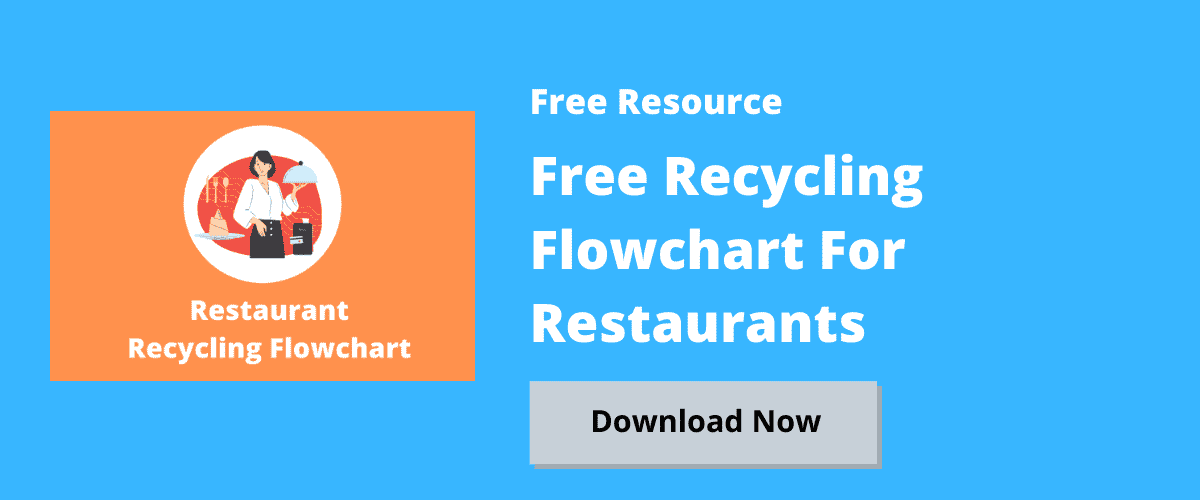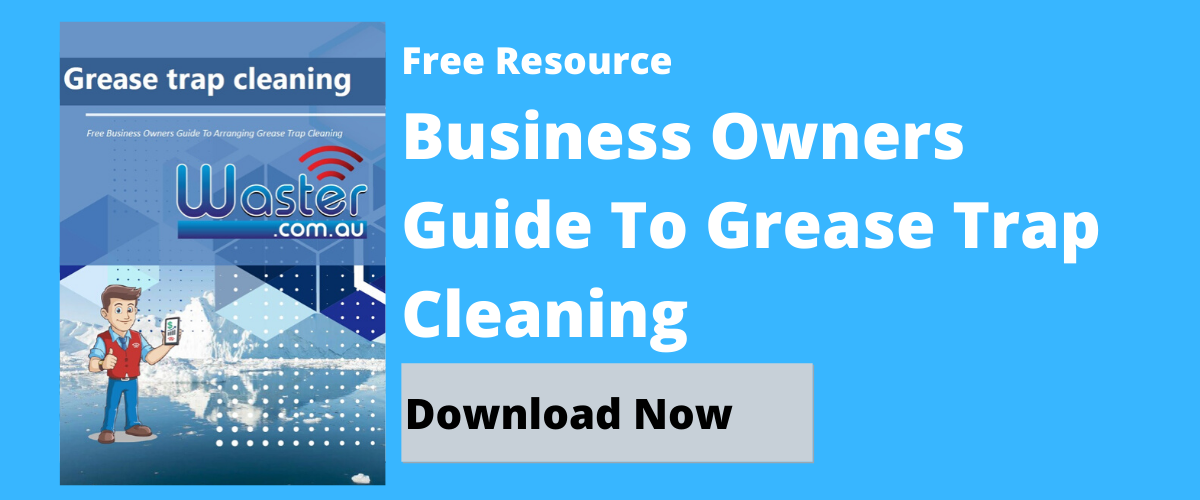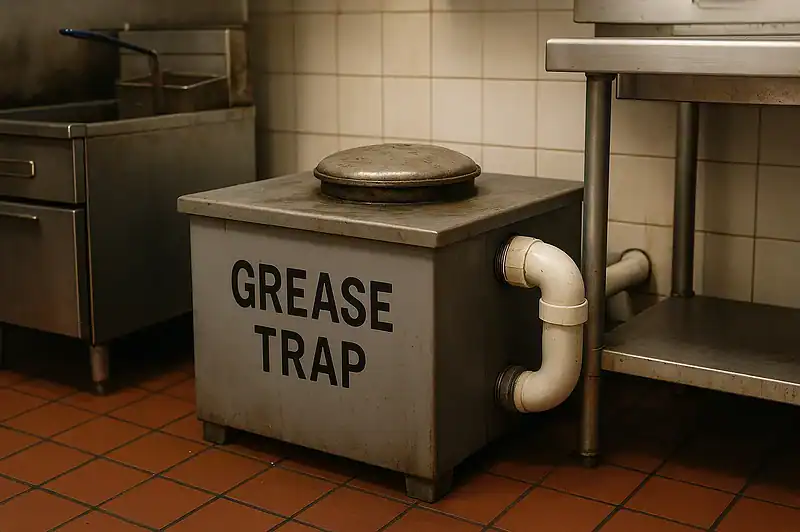Grease Trap Cleaning Melbourne 🛢️: Running a successful restaurant in Melbourne requires attention to countless details, and one of the most critical aspects is maintaining your grease trap. Regular grease trap cleaning protects your business from costly emergencies, ensures compliance with Melbourne Water regulations and maintains hygiene standards.
>Download Now: A Recycling Infographic For Restaurants
Understanding Grease Trap Cleaning in Melbourne: What They Are and How They Work
Grease traps separate fats, oils and grease (FOG) from wastewater before it enters Melbourne’s sewer system. These devices slow wastewater flow, allowing FOG to cool and separate. Lighter grease floats whilst heavier particles sink, enabling cleaner water to flow through drainage systems.
In commercial kitchens, grease traps prevent blockages and environmental contamination. Without proper maintenance, restaurants risk severe plumbing issues and Melbourne regulatory violations.
Types of Grease Traps Used in Commercial Kitchens
Melbourne restaurants typically use one of three main types of grease traps, each suited to different operational needs:
- Passive (manual) grease traps are common in smaller setups and require frequent manual cleaning. These units are cost-effective but demand regular attention to maintain efficiency.
- Automatic grease removal units (AGRUs) offer more efficient operation and are suitable for high-volume kitchens. These systems automatically remove accumulated FOG, reducing manual maintenance requirements.
- In-ground interceptors are larger systems used for heavy-duty needs, often located outside the premises. These units handle substantial volumes of wastewater and are ideal for busy restaurants with extensive kitchen operations.
Why Regular Grease Trap Cleaning Is So Important in Melbourne
Regular grease trap cleaning in Melbourne (or in any other places, really) prevents costly plumbing emergencies and kitchen downtime. Clean traps maintain hygiene standards, reduce foul odours in food preparation areas and ensure smooth kitchen operations and equipment efficiency.
What Happens When You Neglect Grease Trap Maintenance
Neglecting grease trap maintenance leads to FOG build-up, causing blockages, sewer backups and health violations. Melbourne Water and local councils can impose substantial fines or business closure for violations.
Overflowing traps damage pipes and contaminate the environment, leading to expensive repairs and penalties that far exceed regular maintenance costs.
The Grease Trap Cleaning Process Explained
Professional grease trap cleaning involves removing the lid and manually scooping solidified FOG using specialised equipment. Technicians scrub and vacuum to remove accumulated sludge and sediment.
Proper waste disposal occurs in compliance with EPA Victoria guidelines, with detailed records maintained for compliance documentation.
How Often Should You Clean Your Grease Trap?
Cleaning frequency depends on kitchen volume, typically every one to three months. High-volume establishments may require monthly cleaning, whilst smaller operations might extend to quarterly maintenance.
To decide where you should land in that 1–3 month range, lean on the “25% rule”: when the combined grease cap and food solids equal a quarter of the trap’s liquid depth, it’s time to pump out, even if the calendar says you’re not due. Watch for early warnings such as persistent odours, slow or gurgling drains and grease beyond the outlet tee. Keep pump-out dockets and a simple logbook on site
Melbourne councils may require proof of scheduled maintenance for compliance. Consistent cleaning extends plumbing and trap system life, providing long-term cost savings.
Melbourne councils and your water retailer may request evidence during inspections. Use an EPA-licensed contractor who fully empties the trap, scrapes walls, checks baffles and seals and reinstalls lids correctly.
Additionally, train staff to dry-wipe pans, use sink strainers and never pour oil down sinks; these habits stretch intervals and reduce emergency call-outs. Expect frequency to rise in peak seasons or after adding fryers.
Also, don’t forget to set reminders a week before due dates. Regular maintenance prevents blockages, fines and downtime –saving money.

Melbourne Grease Trap Cleaning: Best Practices for Ongoing Maintenance
Implementing daily practices significantly improves grease trap performance. Always scrape food waste into bins before washing dishes, and use strainers in sinks to catch solid debris before it enters the trap.
Maintain a detailed maintenance log to track cleaning and inspections. This documentation proves invaluable during council inspections and helps identify patterns that might indicate potential issues.
Troubleshooting and Inspection Essentials
Watch for warning signs, including slow drainage, bad smells or overflow, which indicate a full trap requiring immediate attention. Schedule routine inspections to spot minor issues before they escalate into major problems.
Partner with a licensed technician for periodic system reviews. Professional assessments can identify potential problems and recommend preventive measures to avoid costly emergencies.
Keeping Your Kitchen Compliant and Blockage-Free
Adherence to Melbourne Water regulations and food safety standards protects your business from penalties and maintains your operating licence. Compliance helps maintain your business reputation and avoids surprise inspections that could disrupt operations.
Ensuring your waste management practices are environmentally responsible demonstrates corporate responsibility and protects Melbourne’s waterways from contamination.
Grease Trap Cleaning Melbourne: Benefits of Hiring a Professional
Professional services handle waste disposal legally and safely, ensuring compliance with all relevant regulations. This expertise saves time and labour for your kitchen staff, allowing them to focus on food preparation and customer service.
Detailed reports from professional cleanings can be used for council or EPA audits, providing the documentation necessary to demonstrate compliance.
Ensuring Environmental and Regulatory Compliance
Proper grease trap cleaning helps prevent FOG from entering Melbourne’s waterways, protecting the environment and avoiding hefty penalties. Compliance with Victorian EPA and water authority regulations is not optional but a legal requirement for all commercial food establishments.
Regular professional cleaning reduces the risk of environmental fines or penalties whilst demonstrating your commitment to sustainable business practices.
Book your next grease trap cleaning in Melbourne today.


